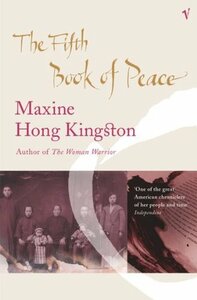Take a photo of a barcode or cover
This is a book about war and peace and loss. I'd read other books by this author and saw this one, which starts out with her losing the novel she'd been writing. Her house burned down, her whole neighborhood burned down. The book is about the fire and the process of rewriting the lost book, with the rewritten book included. The writing has magical elements. It's a really compelling book that made me think a lot about war and peace and what it means to have peace, especially when you have been at war.
I couldn't finish this book. That's a first for me. Maybe in a time when I can enjoy it somewhere other than the Metro, I'll reread it; but I'm not promising anything.
This is a journey. It's more than the book Kingston lost in a fire. The reader gets the rewritten version of her lost text - a family moving to Hawaii in order to avoid the draft. Two artists raising their child to love and not fight, and they are surprised by their "welcoming" and stay. I assume the chapters following "Water" explore the importance of the text and siginificance of a book of peace - what it means on a personal level. My guesses probably make me an ignorant and impatient reader, though.
Kingston's sentences are simple but deliberate. She writes to create an image in the reader's mind. Her style is a mixture of Asian, European, and American writing; the writing itself is forward and explanatory, while the style is personal.
As a predominantly contemporary American reader attempting to expand her range, I knew this was different than anything I've read. At best, I've read straightforward English, Indian, and Chinese fiction, and I thought I could hack it. This requires more than looking at words and enjoying language or a story. Kingston is an experienced writer who knows how to explore multiple realms of writing to create metaphorical depth, understanding in her reader, and a solid story.
This is a journey. It's more than the book Kingston lost in a fire. The reader gets the rewritten version of her lost text - a family moving to Hawaii in order to avoid the draft. Two artists raising their child to love and not fight, and they are surprised by their "welcoming" and stay. I assume the chapters following "Water" explore the importance of the text and siginificance of a book of peace - what it means on a personal level. My guesses probably make me an ignorant and impatient reader, though.
Kingston's sentences are simple but deliberate. She writes to create an image in the reader's mind. Her style is a mixture of Asian, European, and American writing; the writing itself is forward and explanatory, while the style is personal.
As a predominantly contemporary American reader attempting to expand her range, I knew this was different than anything I've read. At best, I've read straightforward English, Indian, and Chinese fiction, and I thought I could hack it. This requires more than looking at words and enjoying language or a story. Kingston is an experienced writer who knows how to explore multiple realms of writing to create metaphorical depth, understanding in her reader, and a solid story.
The long middle section was trying, especially after reading the preceding sections. The final section was a relief following the middle.
challenging
reflective
slow-paced
The narrative of this is very stream of consciousness, she flits about making mental leaps before picking up the thread again in a way that works well to mimic the experiences she's going through - particularly with the experience of making her way through burned streets during the wildfire at the start, the sparking cable lines, so tense!
I found the Water section the most challenging to get through. Wittman can be a deeply frustrating character who is insufferable from time to time. With the plot of this section being so biographical, it's hard to tell what is deliberately constructed to evoke response and what is just an expression of Kingston and her beliefs.
There are some really vivid moments in this that will stay with me, particularly the snorkeling scene and Taña painting the Hawaiian women as the descriptions were ao vivid and technicolour. I also had some really great buddy reading discussions about art, peace, memoir, nature and more. My favourite discussion to come out of this was, are humans capable of curating peace? We have the ability to dream in meaningful ways, to write and create poetry and art, but are we capable of sitting in silence and capturing the peace of nature (although nature is obviously violent in its own way but it's violent for survival, unmeditated? It doesn't hurt for grand ideas, it just sometimes has wildfires that destroy all your possessions but it's not targeted, it just is beyond our control and comprehension)
Whilst I can see that the author has put a lot of interesting construction and details in, I do find it hard to connect with this fully on an emotional level, hence the lower rating, but I do see how some people will absolutely adore this.
I found the Water section the most challenging to get through. Wittman can be a deeply frustrating character who is insufferable from time to time. With the plot of this section being so biographical, it's hard to tell what is deliberately constructed to evoke response and what is just an expression of Kingston and her beliefs.
There are some really vivid moments in this that will stay with me, particularly the snorkeling scene and Taña painting the Hawaiian women as the descriptions were ao vivid and technicolour. I also had some really great buddy reading discussions about art, peace, memoir, nature and more. My favourite discussion to come out of this was, are humans capable of curating peace? We have the ability to dream in meaningful ways, to write and create poetry and art, but are we capable of sitting in silence and capturing the peace of nature (although nature is obviously violent in its own way but it's violent for survival, unmeditated? It doesn't hurt for grand ideas, it just sometimes has wildfires that destroy all your possessions but it's not targeted, it just is beyond our control and comprehension)
Whilst I can see that the author has put a lot of interesting construction and details in, I do find it hard to connect with this fully on an emotional level, hence the lower rating, but I do see how some people will absolutely adore this.
I don't think I actually finished this book, but it's still relatively memorable, years later. I believe that I read it fairly close to the time I read The Opposite of Fate, a memoir by Amy Tan. They melded together in an interesting way. Different stories, common threads.

